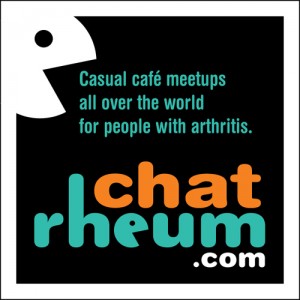This guest post is by Naomi Creek. During Naomi’s five years leading the Young Women’s Arthritis Support Group (YWASG) in Melbourne, Australia, she witnessed the benefits of people living with arthritis meeting up with others in a social setting. Having people from all over the globe ask her how to meet others who live with similar conditions (or how to start their own support group), she decided to start Chat Rheum!
Naomi directed this post at rheumatologists and other health professionals who treat patients with arthritis-related conditions & kindly allowed us to repost it here. Follow Naomi @chatrheum.
When you see a patient for the first time or during a regular visit, your focus is on treating their current symptoms and providing solutions to give them the best possible future. Discussing other coping strategies such as physical, mental and social activities appears to be overlooked sometimes.
“Feeling alone and frightened”is a phrase often expressed by newly diagnosed patients. Their world as they knew it is now gone and the prospect of popping pills and living in pain is something that is extremely overwhelming for them.
For your patients, knowing there are others out there living well with arthritis and being provided information on how to meet them could be the most important thing they take away from their appointment. Along with their scripts and test referrals, they walk out with a sense of hope.
Enter arthritis support groups.
Arthritis support groups have come a long way since the introduction of social media and the internet. What was once seen as only a place for older people to congregate and talk about their painful knees has now become a thriving hub of friendship and positivity. The tech savvy generation with arthritis has embraced thousands of online forums as places to not only receive comfort and understanding, but also to educate themselves about their condition. There are also many ‘real life’ groups providing a regular social outlet in an empathetic environment.
Meeting others with similar conditions has positive physical and psychological benefits. Experienced patients can offer those newly diagnosed a wealth of knowledge and support as they manage their life with a chronic condition. Many people joining support groups say they feel a sense of relief finding other people like them.
Other comments from support group members include:
“I thought I had a great support system, but nothing compares to being able to share with people who truly understand what I was thinking and feeling. It’s amazing how something so small can have such a big impact on how we cope with this disease.”
“Support groups go beyond empathy, they truly understand.”
“Information sharing and camaraderie have proven to be just as valued as my specialists.”
“In moments of despair my support group pals are always there to answer questions and provide the warmth and friendship I need to keep me strong.”
“I leave support group catch-ups buzzing with ideas about how I can help others with arthritis.”
There are many different ways you can provide information about support groups to patients:
- Leave flyers and other information brochures in your waiting room for local and online groups.
- Give patients details of their nearest Arthritis Foundation.
- Suggest they go online and Google a site. Facebook is also a good place to start.
- Suggest chatrheum.com to find locals with arthritis or to arrange meet-ups.



